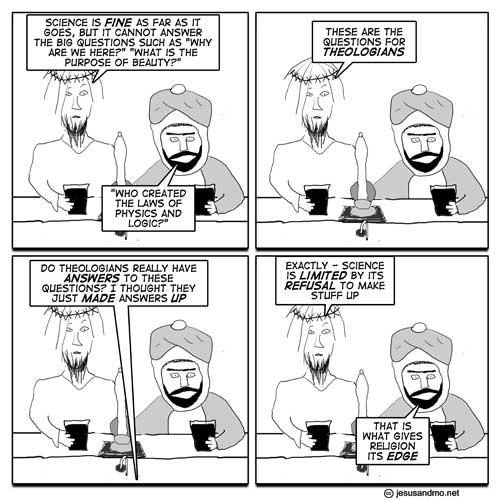Today, PZ posted a blog about a grateful e-mail he received from a student who attended the first Skepticon.
So often I hear people say "What's the point of being an evangelist of reason, nobody's going to change their minds." That's pure bollucks, and it's precisely what the fundamentalists want you to say. People do change their minds.Last semester I took a Religions of the World course, and as an extra-credit assignment, I was given the option to attend an event at the Missouri State University, at which you spoke. I went, and let me tell you, it was probably one of the most jarring and terrifying moments of my life. I'd always known there were those who strongly opposed religion. In fact, one of my best friends in high school was an extreme skeptic, who constantly asked me the tough questions, you know, the ones that usually can only be answered with "He works in mysterious ways." But I'd never been in a room packed with people who whooped and cheered every time a stab was taken at the way I'd chosen to live my life. It was chilling and upsetting and I wanted to leave every second since you'd first opened your mouth. I didn't hate you for saying it. How could I? It was your belief and you were sharing it, which you have every right to do.
But what horrified me the most wasn't the room full of atheists, or the seemingly impenetrable arguments you provided that I should completely dump my faith and see the world in a different light. What turned my stomach and threatened to send me off the edge were the stories you told of Christians giving the rest of us a bad name, such as those at the Catholic Mass when the student stole the cracker and received death threats. I suppose hypocrisy is simply the nature of the conventional Christian. They act like children in a tree house that throw rocks at anyone who hurts their feelings.
Atheists ranting about how the past five generations of my family are superstitious crackpots I can handle, because the atheists are standing for what they believe, but when people who claim to have devoted their lives to furthering the love and compassion that Jesus showed start acting in ways that negate every message they've ever tried to present, or they choose which biblical rules they want to follow and which to ignore, and things like that, it really just makes me sick.
Anyway, I suppose this isn't terribly interesting to you in any event, but I've resolved to stop sitting in church and being spoon fed pre-cooked beliefs, and to start seeking answers by asking questions I was afraid to before. The founder of Buddhism once said, "Do not believe these things because I've told you to, but find truth through your own experiences." I've adopted that to the core of my beliefs.
I still believe in God, and I still consider myself a Christian, but I'm seeing things in a different light. I'm finding the meaning behind the rituals and traditions, rather than just believing there's power in "holy" water or an oyster cracker. I've begun searching for the reasons why certain rules are administered, instead of just saying "because the bible says so".
I don't know if you'll ever read this, and I don't know if I'll ever come in contact with you again, but I want to sincerely thank you. I know I completely missed the purpose of your speech, but whether or not you actually accept my thanks isn't the point. I hope that maybe others of my faith can learn the lesson I did, and I definitely think that it's a good idea to listen what nonbelievers have to say.
After all, knowledge never really hurt anyone, right?
The Skeptical Student was a Christian when I first met him here at MSU. He changed his mind.
In my five years of being a vocal skeptic and critic of religion, I've received over 40 e-mails from people who thanked me for helping them abandon faith. They changed their minds. Who knows how many more never e-mailed me?
Ben over at War on Error changed his mind.
I changed my mind.
Our nation is slowly changing their minds (and even our nation is only following the pattern of the world), and it's because finally, for the first time in the course of the human experiment, a large contingent of people are charging past the taboo of criticising faith and demolishing the pretensions of religion without apology.
Good reasoning is irresistible. If the case for any proposition is strong enough, you will helplessly believe it, whether you can admit it to yourself or not. We have the power to wake people up and expose them to the light of reason. And faith, like cockroaches, does not do well in the light.




